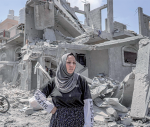You are here
At the upcoming Arab summit
Feb 28,2017 - Last updated at Feb 28,2017
Amman will host the annual Arab leaders’ summit on March 29, 2017.
On the agenda will be myriad of very difficult issues, probably topped by the Arab-Israeli conflict.
Since the Arab League was created seven decades ago, this issue has been a regular item on every Arab League meeting agenda, whether at summit level or below.
Similarly, the issue has been a standard UN agenda item since the international organisation was founded, about the same time as the Arab League.
Despite constant intensive efforts by both organisations, and despite the countless conferences and meetings at various levels addressing the century-old conflict, no progress has been achieved.
In fact, the situation has gone from bad to worse, with the conflict that initially started between the Palestinians and the Jews escalating and expanding.
In its early stage, the conflict engulfed the Arab League states, thus becoming an Arab-Israeli conflict.
Despite the commitment by the Arab states, at the termination of the British mandate on Palestine in 1948, to help the powerless Palestinians against the Zionist onslaught, very little was achieved by the Egyptian, Syrian and Iraqi armies.
With the exception of the small Jordanian Army that successfully fought and saved the West Bank with East Jerusalem from occupation, the other armies hardly achieved anything in what was a terribly planned Arab League effort.
The Gaza Strip was also spared occupation by the Egyptian forces, and the narrow coastal strip became a major shelter for Palestinian refugees escaping brutal Zionist ethnic cleansing atrocities from dozens of neighbouring ethnic cleansed Arab villages.
The remaining 22 per cent of Palestine that was saved for the Palestinians in the 1948 war — the West Bank, East Jerusalem and Gaza — were subsequently lost to the Israelis in the June 1967 war.
In addition, the simultaneous three-pronged Israeli army attack against Syria, Egypt and Jordan resulted in the seizure and occupation of the entire Sinai Peninsula, with the Gaza Strip, all the way to the Suez Canal and the Syrian Golan Heights.
At a later phase, the conflict became regional, with the indirect involvement of Iran and Turkey, and even Pakistan.
The conflict subsequently assumed an Islamic dimension, involving many Muslim countries, and with the added rise of radicalisation and the resulting violence and terror, it became, by all means, a global matter of vital international concern.
The disturbing reality is not only the failure of decades-long efforts to resolve the lethal conflict and to end its disastrous consequences on the entire international system, but rather the fact that wrongs, international law violations, aggression and illegal occupation continue to be perpetrated by Israel, decade after decade, with full and complete impunity if not much complicity.
The repeated efforts by the Arab states, including the Palestinians, to extend to the Israelis one generous offer after another to end the conflict, mostly on Israel’s own terms, were all turned down.
Perhaps it is high time to try a different strategy.
Throughout the long history of the conflict, the Arab side granted Israel recognition, territory, security guarantees, peace treaties with major Arab countries, with full normalisation, historic accord with the Palestinians including security cooperation primarily designed to police the occupation, informal ties with other Arab states, as well as commitment from all the 57 members of the Organisation of Islamic Cooperation to do the same if Israel left the occupied Arab lands.
In return, Israel gave nothing, absolutely nothing.
Israel continues to deny Palestinian rights, colonise the occupied Arab lands, reject all peace moves, refuse to end the occupation of Palestinian, Syrian and Lebanese lands, keep a strangling siege on 2 million people in Gaza and defy all efforts of friend and foe for a settlement.
The summit could send a short but resounding message to the whole world, demanding that Israel ends its occupation of all the Arab lands occupied illegally since June 1967, up to the very last inch, as was the case with Sinai in the Camp David agreement.
There is nothing extreme, unusual or radical in such a legitimate demand of righting the wrong.
It only asks for the due implementation of the UN resolutions passed in accordance with international law.
Why not consider walking away from the dead-end arguments about the issue of one or two states; about what kind of Palestinian state would eventually emerge; about the very dangerous notion of land swaps — a euphemism for annexing the settlements that cover most of the West Bank and all of Jerusalem; and on having to meet the ever-escalating Israeli prohibitive conditions?
The matter is simple: end the illegal occupation of armed forces and settlers first, and discuss the remaining matters after.
The main reason for previous failures is that all negotiations were conducted between two unequal parties: an armed occupier that owns all the tools of power and coercion, and a powerless unarmed occupied population that hardly has support from the so-called international community and has no power of its own.
Palestinians live at the mercy of their occupiers. On top of that, they are being tasked with the duties of their occupiers, not only doing administrative work on their behalf, but also providing security protection for both the occupation army and the settlers.
The Palestinian Authority police tasked with preserving order ends up protecting the settlers more than their own people from unchecked daily settler attacks and atrocities against innocent Palestinians and their private property.
In decades of distraction, deception and shuffling cards, the issues have been confused beyond recognition.
The main issue is the occupation. Bring it back to the core of the discourse.
The next summit is the right time and place.













